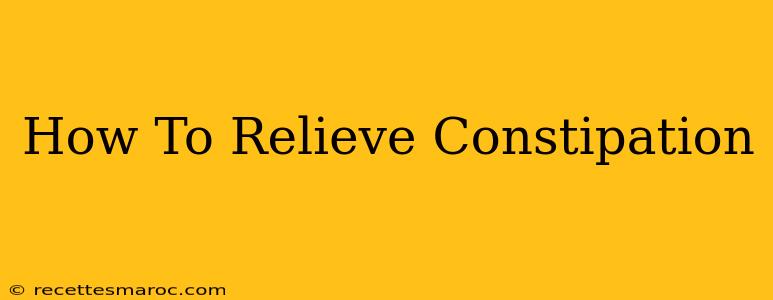Constipation, that frustratingly uncomfortable feeling of infrequent or difficult bowel movements, affects millions. But relief is within reach! This comprehensive guide explores effective ways to relieve constipation, combining simple home remedies with sustainable lifestyle changes. We'll cover everything from dietary adjustments to exercise and when to seek professional medical advice.
Understanding Constipation: What Causes It?
Before diving into solutions, let's understand the root causes of constipation. Several factors can contribute, including:
- Low Fiber Intake: A diet lacking in fiber, the indigestible part of plant-based foods, is a major culprit. Fiber adds bulk to your stool, making it easier to pass.
- Dehydration: Insufficient water intake makes stool hard and dry, hindering its movement through the intestines.
- Lack of Physical Activity: Regular exercise stimulates bowel movements. A sedentary lifestyle can contribute to constipation.
- Ignoring the Urge to Defecate: Delaying bowel movements weakens the bowel's natural urge, leading to harder stools and constipation.
- Medications: Certain medications, including some pain relievers and antidepressants, can cause constipation as a side effect.
- Medical Conditions: Underlying health issues like irritable bowel syndrome (IBS), hypothyroidism, and diabetes can also contribute to constipation.
Effective Home Remedies for Constipation Relief
Several simple home remedies can provide quick relief from constipation:
1. Increase Your Fiber Intake:
The Power of Fiber: Adding more fiber-rich foods to your diet is crucial. Aim for a gradual increase to avoid gas and bloating. Excellent sources include:
- Fruits: Apples, bananas (ripe), berries, pears
- Vegetables: Broccoli, Brussels sprouts, carrots, spinach
- Whole Grains: Oatmeal, whole-wheat bread, brown rice
- Legumes: Beans, lentils
2. Stay Hydrated:
Water is Key: Drink plenty of water throughout the day. Aim for at least eight glasses, or more if you're physically active or live in a hot climate. Other fluids like herbal teas can also help.
3. Incorporate Physical Activity:
Move Your Body: Regular exercise stimulates bowel movements. Even a moderate amount of daily activity can make a difference. Consider brisk walking, swimming, or cycling.
4. Listen to Your Body:
Don't Ignore the Urge: When you feel the urge to have a bowel movement, don't delay. Ignoring it can worsen constipation.
5. Consider Over-the-Counter (OTC) Remedies:
Gentle Relief: For occasional constipation, OTC remedies like stool softeners or bulk-forming laxatives can provide temporary relief. Always follow the directions on the label.
When to Seek Medical Advice
While home remedies are often effective, it's crucial to seek medical attention if you experience:
- Severe or persistent constipation: If constipation lasts for more than two weeks, consult a doctor.
- Blood in your stool: This requires immediate medical attention.
- Sudden changes in bowel habits: Any abrupt changes warrant a doctor's visit.
- Severe abdominal pain: Intense abdominal pain accompanied by constipation needs prompt medical evaluation.
Preventing Constipation: Lifestyle Changes for Long-Term Relief
Adopting a few lifestyle changes can significantly reduce your risk of constipation:
- Eat a balanced diet: Focus on a diet rich in fruits, vegetables, and whole grains.
- Stay hydrated: Maintain adequate fluid intake throughout the day.
- Exercise regularly: Incorporate regular physical activity into your routine.
- Manage stress: Stress can affect bowel function. Practice stress-reducing techniques like yoga or meditation.
- Establish a regular bowel routine: Try to go to the bathroom at the same time each day to train your bowels.
Disclaimer: This information is for general knowledge and does not constitute medical advice. Always consult a healthcare professional for any health concerns or before making any decisions related to your health or treatment.

